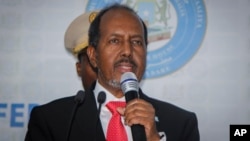Somalia’s newly-elected president, Hassan Sheikh Mohamud, says his government will focus on urgent issues including security, economic recovery, political stability, and debt relief during his first 100 days in office.
Mohamud was elected Sunday for the second time, defeating incumbent Mohamed Abdullahi Mohamed. Mohamud returns to power after serving as president from 2012 to 2017.
“We want to implement what we want to do in my first 100 days in office. We want to reform the old legal framework and the structure of our security agencies; we want to federalize the security apparatus,” Mohamed told VOA Somali in an exclusive interview.
Battling al-Shabab, the al-Qaida-affiliated terror group that has stepped up its attacks in Mogadishu in recent months, is one of the biggest challenges that lies ahead for the president.
Defeating al-Shabab has remained beyond the grasp of Mohamud and every other Somali president since the group came into being about 15 years ago. Mohamud knows first-hand the danger al-Shabab poses, having survived several assassination attempts during his first term.
Mohamud, however, has voiced confidence that his country will turn the corner, saying securing Mogadishu, the capital of Somalia, is one of the priorities in his first 100 days.
“To secure Mogadishu, we want to operate and secure it from its corridors such as the Lower and Middle Shabelle regions and inside the city we will establish a strong intelligence presence,” the president said. “We will ask for support and collaboration from anyone who is willing to help us to ensure the security.”
Hours ahead of the VOA exclusive interview, Mohamud welcomed word that U.S. special operations forces will again be based in Somalia to help in the fight against the terror group.
He thanked U.S. President Joe Biden in a tweet Tuesday, calling the United States “a reliable partner in our quest to stability and fight against terrorism.”
His re-election on Sunday follows nearly a year of political uncertainty marked by disputes between the president and prime minister and the federal and regional levels of government.
The turmoil nearly boiled over in February 2021 when parliament passed a motion to extend President Mohamed’s term by two years. Lawmakers reversed their decision in the face of strong pressure both domestically and abroad.
Despite assuming office with daunting tasks, Mohamud pledges to steer the country toward peace and reconciliation.
“To create political stability is also one of my priorities in my first 100 days. We must come up with an inclusive agreement with the leaders of the federal-member states that federalizes the most important issues, including security,” he said.
While he is in office, Mohamud said he will work on a national plan that would scrap the clan-based complex election formula and lead the country to a one-person, one-vote system.
“When I was handing over my presidency in 2016, I also handed over a detailed plan that would have led the country to a different voting system and now my plan is to work on that so that the county will not go back to the controversial clan-based power sharing system,” he told VOA.
Mohamud said he will soon nominate a prime minister and work on legal reforms designed to resolve the chronic power struggles, between Somali presidents and prime ministers, that derailed the efforts of the past governments and weakened cooperation among federal government institutions.





